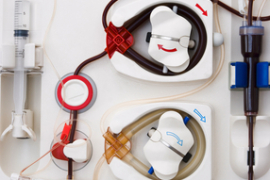A pregnant woman with periodontal disease is at a significantly higher risk of delivering a low birth weight baby, according to a new study in the Journal of Periodontology.
According to the March of Dimes, a baby is considered to be of low birth weight when he or she weighs less than 5 pounds, 8 ounces at birth. Babies who are born this small are at an increased risk of many health problems, including respiratory distress syndrome, bleeding in the brain, and heart, digestive, and eye problems.
For this study, researchers studied 372 mothers who had recently given birth to determine whether periodontal status and/or blood sugar levels may have had an impact on low birth weight. Researchers used traditional clinical measures of periodontal disease—including bleeding on probing, clinical attachment loss, and probing depth—and HbA1c levels to detect blood glucose level.
Mothers with periodontitis were six times likelier to have a child with low birth weight, after adjusting for confounding factors. Researchers also noted that this statistically significant increase was true for women with normal blood sugar levels but not for those with high blood sugar.
They concluded:
“Periodontitis and glycemic levels appeared to have opposing influences on birth weight, with periodontitis being associated with LBW and the magnitude of the association being altered depending on maternal blood glucose level.”
While this study did not measure the microbial component of periodontal disease, previous research tells us that oral pathogens associated with periodontal disease likely play a large role in this increased risk for pregnancy complications like low birth weight.
Women generally have a greater impact from hormones and lifestyle factors such as stress, diet, and sleep on oral biofilm that might not necessarily be visible to the eye. This impact can be exacerbated during pregnancy, making it even more worrying that these dangerous effects can still occur without any visual signs of trouble.
When the most delicate part of life—a newborn—is involved, the stakes are raised. Helping women who are or who plan to become pregnant achieve total wellness—including oral health management, stress reduction, and sleep in addition to traditional prenatal care—is the coordinated, multi-disciplinary approach that women and babies deserve.
Source: Relationship Among Mothers’ Glycemic Level, Periodontitis, and Birth Weight



